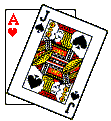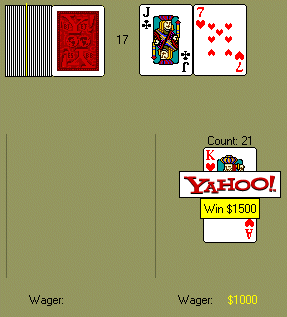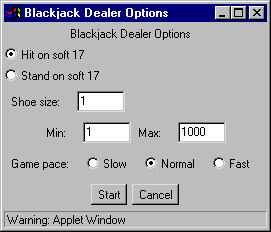



The Rules of
Blackjack
|
The object of blackjack is to beat
the dealer.
Although you may be playing with others at the same
table, you are never competing in any way against these
players... and they are never competing against you. The object is to come closer to 21 points than the dealer, without going over. If you go over 21 points, you "bust" and automatically lose. Card Values: Aces count 1 or 11 points, whichever is most advantageous for you. 10's, jacks, queens, and kings all count 10 points. All other cards count their face value. Before you receive any cards, you must bet. You do so by clicking on the little numbered buttons, as shown in the graphic:
(The "Max" button is simply a convenient way to bet the maximum amount you are allowed, as defined by the limits of that particular table.) When you have entered your desired total, click on "Place Bet." After placing your bet, you and the dealer will each receive two cards. One of the dealer's cards will be dealt to him face down, with its value unknown to you. This is known as his "hole card." The other card, know as his "upcard," will be dealt face up. At receiving your two cards, if you have an Ace and a 10 value card, this is known as a "blackjack" or a "natural" and, providing the dealer also does not have a blackjack, is an automatic winner. All blackjacks are paid 3 to 2. (1.5 times your original bet.) |
 |
Here is an example of a blackjack. The Ace and the king combine to make 21 points. In this example, since the dealer does not have a blackjack, it is an automatic winner. |
| You must always act on your hand first, before the dealer. If you are not dealt a blackjack, then you will always have at least three options, and possibly four.
|
| Here is an example of a
hand before it was "split." This player
received two eight's and decided to split them...
|
... which simple means he
is now playing two different hands at the same time. The
end result is shown. The first hand on the left won, but
the second hand was a bust and lost.
|
| If you SPLIT your hand, you then
will receive another card on each of the pair you split,
and you must then choose to either HIT, STAND, DOUBLE or
SPLIT here as well. Simply
click on the appropriate button |
| After you have acted upon your hand,
if your point total has not exceeded 21 points, the
dealer will then act upon his. And although you may play
your hand as you see fit, even varying the way you play
from one hand to the next, the dealer has a fixed set of
rules... he always
plays his hand the same way. The dealer must HIT any hand
which totals 16 points or less, and must STAND on any
total which is 17 points or more. and unlike you, the
dealer does not have the option to SPLIT his pairs. At Yahoo!, if the dealer's hand totals 17 points and contains one or more aces, this is known as a "soft 17." Depending upon the particular table you are at, the dealer may be required to hit this soft 17. |
| When the table is first created, the person creating it must choose whether he wants the dealer to HIT soft 17's or STAND on them. |  |
| If the dealer "busts" and
goes over 21 points, then you win. If neither of you has busted, then the person with a point total closer to 21 is the winner. If there is a tie, this is known as a "push" and no money exchanges hands; you neither win nor lose. |
| If the dealer is dealt an ace as his upcard, you will then be offered another bet, known as an INSURANCE bet. This is a side bet, at 2 to 1 odds, on whether you think the dealer has a 10 value card as his hole card. Here at Yahoo!, this side bet is always one half of your original bet. If you are offered insurance, you simply click "Yes" or "No." If you click yes, Yahoo! will automatically deduct one half of your current bet from your bankroll. If the dealer has a 10 value card in the hole, you would then win your insurance bet. If the dealer does not have a 10 value card in the hole, you would lose this insurance bet and play would continue as normal. |
